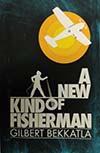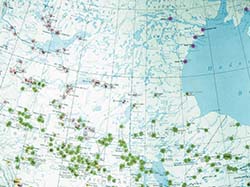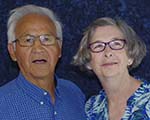by Gilbert Bekkatla
 AFTER MY CARPENTRY TRAINING was complete, in 1978 we moved our family up to Buffalo Narrows (SK). I got a job with the provincial government on the construction of a 33,000 square-foot maintenance building, and then stayed on maintaining that facility. Following our two sons, Laura and I soon welcomed two daughters to our family.
AFTER MY CARPENTRY TRAINING was complete, in 1978 we moved our family up to Buffalo Narrows (SK). I got a job with the provincial government on the construction of a 33,000 square-foot maintenance building, and then stayed on maintaining that facility. Following our two sons, Laura and I soon welcomed two daughters to our family.
I worked for awhile under a supervisor, then got my Journeyman Carpenter Certification. I also did extra carpentry “moonlighting” work in the evenings and on my days off. (I guess I am a workaholic just like my dad.) Lots of times I worked after supper till 11 at night. As a new Christian, I wanted to help with the Lord’s work and I started helping out at Pine Ridge Bible Camp. The first cabin I built there is still standing (even though the Bible says not to build on the sand!).
Laura and I and our children became part of the church in Buffalo Narrows. Eventually our church built its own building, and I was involved in the construction. I was asked to serve on the church council.
Every year some students from Key-Way-Tin Bible Institute in Lac La Biche (AB) would come for what they called “10-Day Ministry.” We hosted students in our home every year for at least five years, and those students had a big impact on us. We began travelling to KBI once or twice a year for their Bible conferences. And we started thinking and praying that maybe someday we could be like those students.

“There are over 20 Denesuline communities (shown by pink color dots with letters ‘Ch’), most of them I have visited regularly,” says Gilbert. Denesuline people also now live in several of Canada’s larger and smaller cities.
One summer our church had planned for the SonRise Indian Gospel Band to do an outdoor concert in the nearby community where I grew up. That evening some men, including my relatives, blockaded the road to keep the Gospel team out. I shed lots of tears that night on the way home. I felt like my extended family had disowned me.
Being rejected because of the Gospel is hard, but I learned over the years that I could take it. That’s the price you have to pay to be a Christian. But I don’t stay away from people even though they don’t like me. I have had others who I grew up with threaten me. They resented me because I had turned my back on the church in which we’d all been raised.
I think of the Lord Jesus, how He was rejected. I think that His rejection was much more than physical.
BURNING our BRIDGES
Laura and I knew that we could serve the Lord better if we went to Bible school. It was not an easy decision. We would not have an income, and I considered myself a self-made man. My dad had drilled into me that working hard is the way to get things. So it was a very big change for me to quit my job and trust the Lord to supply our financial needs. In 1985, when we moved our family to Alberta for Bible school, we burned our bridges behind us, and sold our mobile home.
I remember the first year we were at school, I was so lonely for my extended family – though I had my own family there in our little three-bedroom student house. I made it through the first semester, but I still remember standing outside by the trees one evening at Christmas time. I looked over to a staff house where I knew that their whole extended family was together. I thought about walking over there, but then I thought, “They’re happy there together. Why should I spoil that?”
As it turned out, our family was invited over to that home the next day for a Boxing Day meal. It was great, and there were other holiday blessings.
Laura and I had three years of classes at Key-Way-Tin with lots of assignments, but I think it was the staff and fellow students who were having the greatest impact on us.
When our first year of classes was over, we joined a summer missions program called NMTC and were sent to the Northwest Territories. There have been a number of adults come to faith in Christ in that NWT community since that summer, but a lot of our work then was with children. We visited every house in the community just to make friends, and kids would come to our place for Bible lessons.
That summer there were over a dozen kids who indicated that they wanted Jesus to be their Saviour. Years later I was visiting there and, among the people gathered for a Sunday service, I was happy when I recognized three of those kids, now grown.
After our second year of Bible school we spent the summer back in Buffalo Narrows. It was great to fellowship again with our home church, and I was given a lot of opportunity to practice my preaching.
I think that both summers confirmed our desire to be full-time missionaries. We already knew what we would be getting into. Before Bible school, we had been mentored by the missionaries in Buffalo and worked alongside them. We had helped at Pine Ridge Bible Camp, and had gone with the missionaries as they visited homes and led Bible studies in outlying places around Buffalo. We had even faced opposition. Would there be more?
THE CALL
Through our three years at Bible school, we continued to believe that God was calling us to full-time missionary work. It just seemed natural that we would join Northern Canada Evangelical Mission (NCEM), the same organization as our missionary friends in Buffalo Narrows, and operated the Bible school.
That was the direction we were headed, but at some point we had to make a definite decision. Growing up, I recall my dad often saying, “If you want the job done, you’ll have to do it yourself.” That thinking played a role in me deciding to serve in missions full-time.
Also, Laura influenced my decision. Somehow she saw in me potential for spiritual leadership among my own Denesuline people, and that helped confirm God’s call. My call has also included reaching out to Cree, Metis and Caucasian people, but my biggest burden was for the Dene. It’s the needs of my own people that I noticed the most.
After our acceptance into the Mission, there would be the decision about where we would live and serve. But even before that there would be some short-term training, and we would have to raise our financial support.
For us to serve among my own Denesuline people seemed the right choice for us and the Mission leaders. Usually “missionary” means going cross-culturally to another people than your own, but the word means “sent one,” so that is why we refer to ourselves as missionaries. We believe that we had been called and sent by God.
A big factor in where we would serve had to do with language. Denesuline belongs to the Athapaskan family of languages and is very complex, I’ve been told. (It is related to the Navajo language which the Code Talkers used in World War 2. The Navajo language baffled Allied enemies who couldn’t transcribe it, let alone decode it.)
Yatthe Lake is not the real name of the community, but that is what I will call it here. Before we moved there with our children, Laura and I visited there, along with Roan Elford, a missionary who with his wife, Pat, had spent a bit of time there. We first stopped in Prince Albert, where some missionary friends lent us their parkas and winter clothes, which they knew we would need.
Every day we visited homes, meeting new people. Mr. Carroll Hill was NCEM General Director at the time, and was in contact with the Yatthe Lake chief about us moving there. The chief had told him, “We’re open to you moving here.” We said, “We’ll go.”
So with our children (aged 16, 13, 10, 8) we moved to Yatthe Lake. Our house was just 20 x 25-feet in size, but I would soon build onto it a 16 x 20-foot extension, adding one bedroom.
LIFE & MINISTRY at YATTHE
As we settled into Yatthe, sometimes I thought about our neighbours back in Buffalo Narrows – what would they think if they could see us now the way we were living? There was Laura, the university educated hard-working school teacher, and me, a journeyman carpenter. Even our outhouse in Yatthe Lake was built with scraps! I’m sure they would have wondered, “Have those Bekkatlas lost their heads?” Of course, those would have been people who wouldn’t understand that this was for the Lord’s work.
In Yatthe Lake there was a mainline church, but no full-time leader, only a lay leader. He wasn’t unfriendly to me, but he might have felt a little bit threatened when we moved in. He did consider me to be a minister, though. One day he said to me, “Gilbert, I don’t know why you don’t wear a collar.” I answered, “Because I will look 20 years older if I were to dress in a robe!” Then I added, “I’m a Christian, and it’s really what’s in your heart, soul and spirit.” He seemed to accept that.
The people at Yatthe Lake welcomed us into their homes for visits, and I would go fishing with the men. I also went hunting with them, and I noticed that they were much more relaxed with me out there, as compared to back in the community.
It seemed when we were in their homes, the people were somewhat open to talking about spiritual things, and we could read the Bible. Our approach was go to where the people are, not wait for them to come to us. If someone showed by their actions that they didn’t want us around, we would not try to stay. Most of our ministry was to individuals and families, not group meetings.
Most of the people were welcoming. At the same time, right from the start, I felt something. I call it spiritual opposition. When you are a First Nations born again Christian believer, you feel this opposition more than others. I felt it more in Yatthe than Laura did. Christianity is okay for her as a Caucasian person, the people would think, but how about for me? I was told by some that I had turned my back on my own people. When you hear that, those are very tough times.
So how did I respond to all that spiritual opposition? First of all, I turned to God’s promises in His Word to assure myself that I belonged to Christ, and I could rely on His protection. I had to make sure I had a clean heart before God. And then the Lord would remind me that He had called us to be at Yatthe Lake and we had His authority to be there.
It was interesting because there were some occasions when they recognized that I had God’s protection. One time was when I got caught in my boat in some dangerous rapids, but safely made it through. After that some of the men started calling me the Dene name for “Amazing Kid” (to them, a “kid” was anyone under 50 years of age!).
When we moved to Yatthe Lake, the first question that people asked all the time was, “How long are you going to stay?” This is how I answered: “We want to stay and die with you people.” Well, that was easier said than done.
This article is adapted from “A New Kind of Fisherman.” Order your copy (114 pages, $6.60 plus shipping) by visiting www.tribaltrailsbooks.com or phone toll-free: 1-833-751-1215 / Ext. #122.



